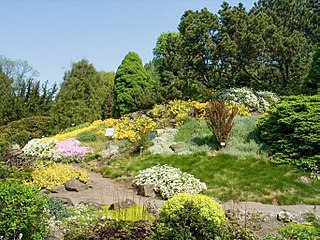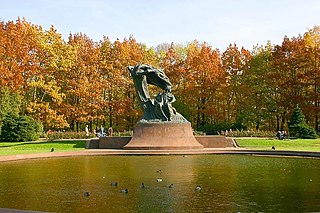 W
WArboretum Wirty - an arboretum in northern Poland, near Wirty, by the Borzechowskie Lake.
 W
WThe Botanic Garden of the Jagiellonian University is a botanical garden, founded in 1783 in Kraków. It is located east of the Old Town and occupies 9.6 hectares. It belongs to the Jagiellonian University and is classified as a historical location.
 W
WBranicki Palace is a historical edifice in Białystok, Poland. It was developed on the site of an earlier building in the first half of the 18th century by Jan Klemens Branicki, a wealthy Polish–Lithuanian Commonwealth hetman, into a residence suitable for a man whose ambition was to become king of Poland. The palace complex with gardens, pavilions, sculptures, outbuildings and other structures and the city with churches, city hall and monastery, all built almost at the same time according to French models was the reason why the city was known in the 18th century as Versailles de la Pologne and subsequently Versailles de la Podlachie.
 W
WThe Dendrological Garden in Przelewice is a botanical garden, founded in 1933 in Przelewice, Pyrzyce County. It is located to south-east from Pyrzyce, 60 km from the center of the city of Szczecin. The garden occupies 45 hectares.
 W
WGrafenort Castle is a (former) stately residence in the Kłodzko Land of the Lower Silesia. A sixteenth-century German foundation, it has been in the hands of the von Herberstein family of Grafs or Counts since the second half of the seventeenth century until 1930 — hence its name, and one of the former names of the village in which it is situated.
 W
WHelenów Park in Łódź, Poland is a park located between Północna, Źródłowa and Smugowa streets and covers an area of 12 hectare. Of all park trees, five are natural monuments: two pedunculate oaks with a circumference of 320 and 340 cm, common beech with a circumference of 245 cm, red oak with a circumference of 350 cm and ash tree with a circumference of 385 cm. The park is entered in the Registry of Objects of Cultural Heritage.
 W
WWrocław's Japanese Garden was founded in the years 1909–1913 as an exotic garden for the Centennial Exhibition. It is located in the Śródmieście district of Wrocław, in the boundaries of Szczytnicki Park, near the Centennial Hall. It is home to almost 270 taxa of woody plants, as well as 78 species of Asian plants, of which 38 are endemic to Japan, such as Styrax japonicus. It is an important landmark of Wrocław.
 W
WThe Prince Józef Poniatowski Park in Łódź is a park in Łódź, Poland located between Żeromskiego, Mickiewicza, Jana Pawła II and Parkowa Streets. The area of the park is 41.6 ha. It was named in honour of Polish general and statesman Prince Józef Poniatowski (1763–1813).
 W
WThe Kórnik Arboretum in Kórnik, in western Poland, is the largest and oldest arboretum in Poland and fourth-largest arboretum in Europe, with over 3300 taxa of trees and shrubs. It was established in the early 19th century around the historical Kórnik Castle by its owner, Count Tytus Działyński, later enriched with new species and varieties by his heirs, his son Jan Kanty Działyński and grandson Władysław Zamoyski.
 W
WŁańcut Castle is a complex of historical buildings located in Łańcut, Poland. Historically the residence of the Pilecki, Lubomirski and Potocki families, the complex includes a number of buildings and is surrounded by a park.
 W
WŁazienki Park or Royal Baths Park is the largest park in Warsaw, Poland, occupying 76 hectares of the city center.
 W
WMuskau Park is a landscape park in the Upper Lusatia region of Germany and Poland. It is the largest and one of the most famous English gardens in Central Europe, stretching along both sides of the German–Polish border on the Lusatian Neisse. The park was laid out from 1815 onwards at the behest of Prince Hermann von Pückler-Muskau (1785–1871), centered on his Schloss Muskau residence.
 W
WPlanty Park is a city park in Białystok with an area of 14.94 ha. It connects the May 3 Constitution Park with the Poniatowski Park.
 W
WThe Różanka Rose Garden, is a two-hectare botanical garden in the Łękno area of Szczecin, Poland.
 W
WThe Saxon Garden is a 15.5–hectare public garden in central (Śródmieście) Warsaw, Poland, facing Piłsudski Square. It is the oldest public park in the city. Founded in the late 17th century, it was opened to the public in 1727 as one of the first publicly accessible parks in the world.
 W
WSurvivors' Park is a park in Łódź commemorating people who went through the Ghetto Litzmannstadt existing during World War II, being one of the elements of the plan to exterminate Jews of the Third Reich. The park was officially opened on August 30, 2004, on the 60th anniversary of the liquidation of the ghetto. The park is located in the former territory of Lodz Ghetto, between Wojska Polskiego Street and allotment gardens at Sporna Street in the valley of the Lodz River, in the area adjacent to the borders of the Litzmannstadt Ghetto during the war in Smugowa Street. The park was designed by Grażyna Ojrzyńska.
 W
WŚwierklaniec is a village in Tarnowskie Góry County, in the Silesian Voivodeship of southwestern Poland. Formerly, from 1975—1998, Świerklaniec was a part of the Katowice Voivodeship.
 W
WWojsławice Arboretum is an arboretum, located in Wojsławice, Dzierżoniów County, Lower Silesian Voivodeship, in south-western Poland. It occupies an area of 62 ha.